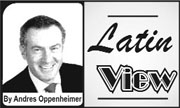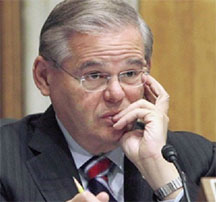Despite the excitement among many in Venezuela and Miami about the newly announced US visa restrictions against top Venezuelan officials linked to human rights abuses, I’m not so sure that the measures will have much impact.
Before I tell you why, let me say out front that I don’t buy Venezuela’s ridiculous claims that these targeted sanctions against individuals linked to the bloody repression of student protesters are an intervention in Venezuela’s internal affairs.
Any country has the legitimate right to decide who it grants visas to visit its territory. These are not economic sanctions against Venezuela, but against about two dozen officials who will not be allowed to vacation in Disneyworld.
 According US officials, the list of unidentified Venezuelan officials includes cabinet ministers, presidential advisers and judges who were linked to the repression of student protests earlier this year. The protests left at least 43 dead, 50 documented cases of torture, and more than 2,000 unlawful detentions, according to Human Rights Watch and other rights monitoring groups.
According US officials, the list of unidentified Venezuelan officials includes cabinet ministers, presidential advisers and judges who were linked to the repression of student protests earlier this year. The protests left at least 43 dead, 50 documented cases of torture, and more than 2,000 unlawful detentions, according to Human Rights Watch and other rights monitoring groups.
But there are several reasons why I fear that these targeted sanctions are too timid, and too vague, to be effective.
First, they don’t go after the targeted officials’ financial assets. They should seek to freeze the US assets of Venezuelan officials and government cronies involved in human rights abuses, and expose the fortunes they have amassed since late President Hugo Chávez rose to power 14 years ago.

It can be tried. In March, the Obama administration announced both travel bans and financial sanctions against 11 Russian officials and oligarchs involved in Russia’s annexation of Crimea.

A US Senate bill co-sponsored by Sen Bob-Menendez (D-NJ) and Sen Marco Rubio (R-FL), which may be voted on by the Senate this week, calls for the freezing of US assets of Venezuelan officials involved in human rights abuses. This would include US bank accounts, US stocks held in any US and foreign banks, and US real estate.
There are many known cases of Chavista millionaires with mansions in Florida, some of them mentioned by name in Casto Ocando’s book Chavistas in the [US] Empire. Other Venezuelan human rights violators’ assets should be traced by the US Justice and Treasury Departments through mutual assistance treaties with other nations.
According to human rights activists, financial sanctions are more effective than travel bans because they tend to be more embarrassing. Much like it took revelations about late Chilean dictator Augusto Pinochet’s dozens of international bank accounts to convince many of his supporters in Chile that he was a bad guy, nothing would be more embarrassing to Venezuela’s millionaire pseudo-revolutionaries than to expose their hidden bank deposits or condos abroad, they say.
The second reason why I’m sceptical that the travel ban by itself will not have any major impact is that the targeted officials are not identified. A senior US official told me that under the US immigration laws that were used to issue the Venezuelan officials’ travel ban, they cannot be identified. However, when the Obama administration announced the visa revocation of Russian officials over the Crimea crisis, it did identify the Russian officials by name.
The third reason that makes me wonder about the US travel restrictions for Venezuelan officials is that — in the absence of exposing their millions in foreign bank accounts —they will give Venezuelan President Nicolás Maduro an excuse to “internationalize” the Venezuelan crisis, which is exactly what he wants.
It will allow Maduro to shift the focus of the Venezuelan crisis from a domestic conflict between a dubiously elected authoritarian regime and the opposition, to an international dispute between an allegedly rightful Latin American county and the US “empire.”
The Venezuelan regime always tries to portray itself as a victim, in part to justify the fact that it has left Venezuela bankrupt despite benefiting from the biggest rise in oil prices in Venezuela’s history.
My opinion: Targeted sanctions against individual human rights abusers, such as denying them travel visas, are a perfectly legitimate tool to punish human rights abusers, and — in Venezuela’s case — may be long overdue.
The big question is whether visa restrictions against anonymous officials without financial disclosures of these individuals’ foreign bank accounts will have enough of an impact to compensate for Maduro’s propaganda campaign portraying himself as a victim of the US “empire.”
As long as these sanctions hurt only Venezuelan officials involved in human rights abuses, and not the Venezuelan people, Washington should go all the way — and include these officials’ assets abroad, and those of their figureheads.
© The Miami Herald, 2014. Distributed by Tribune Media Services.








